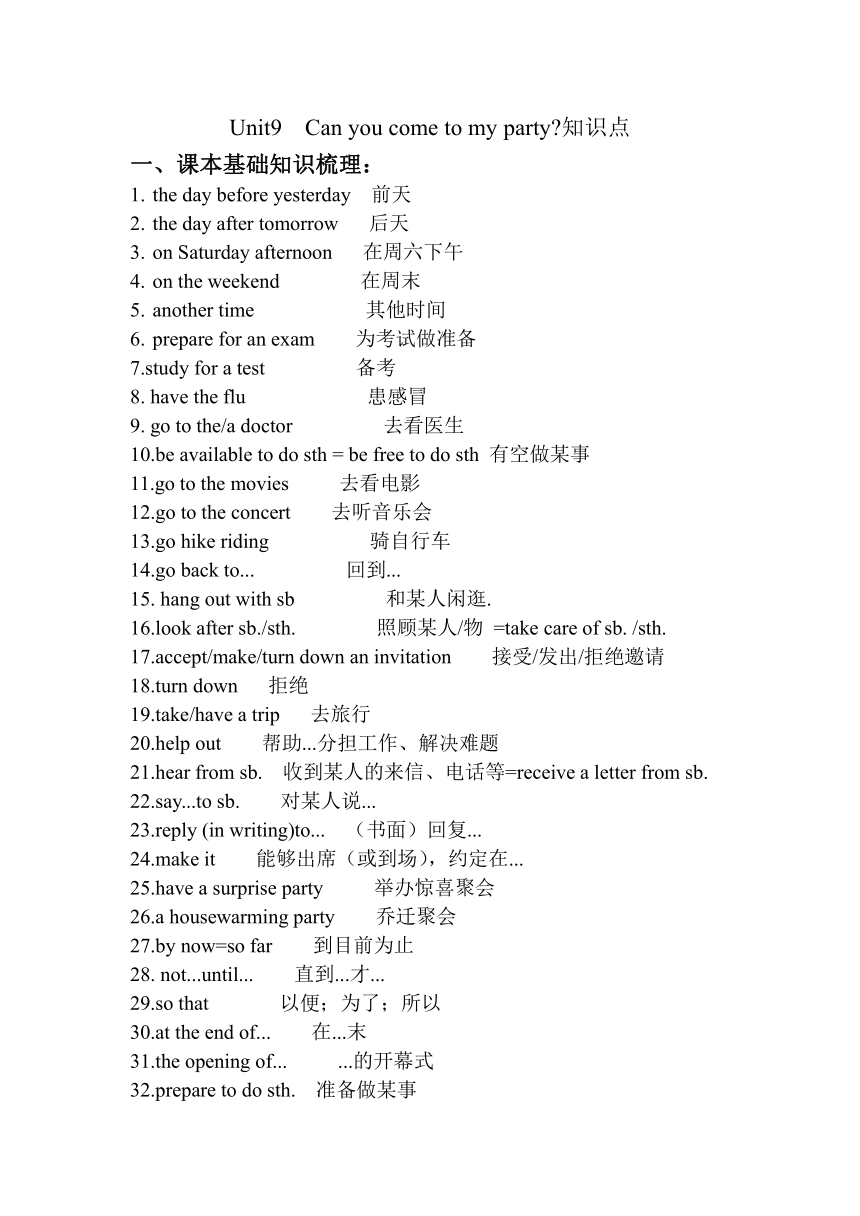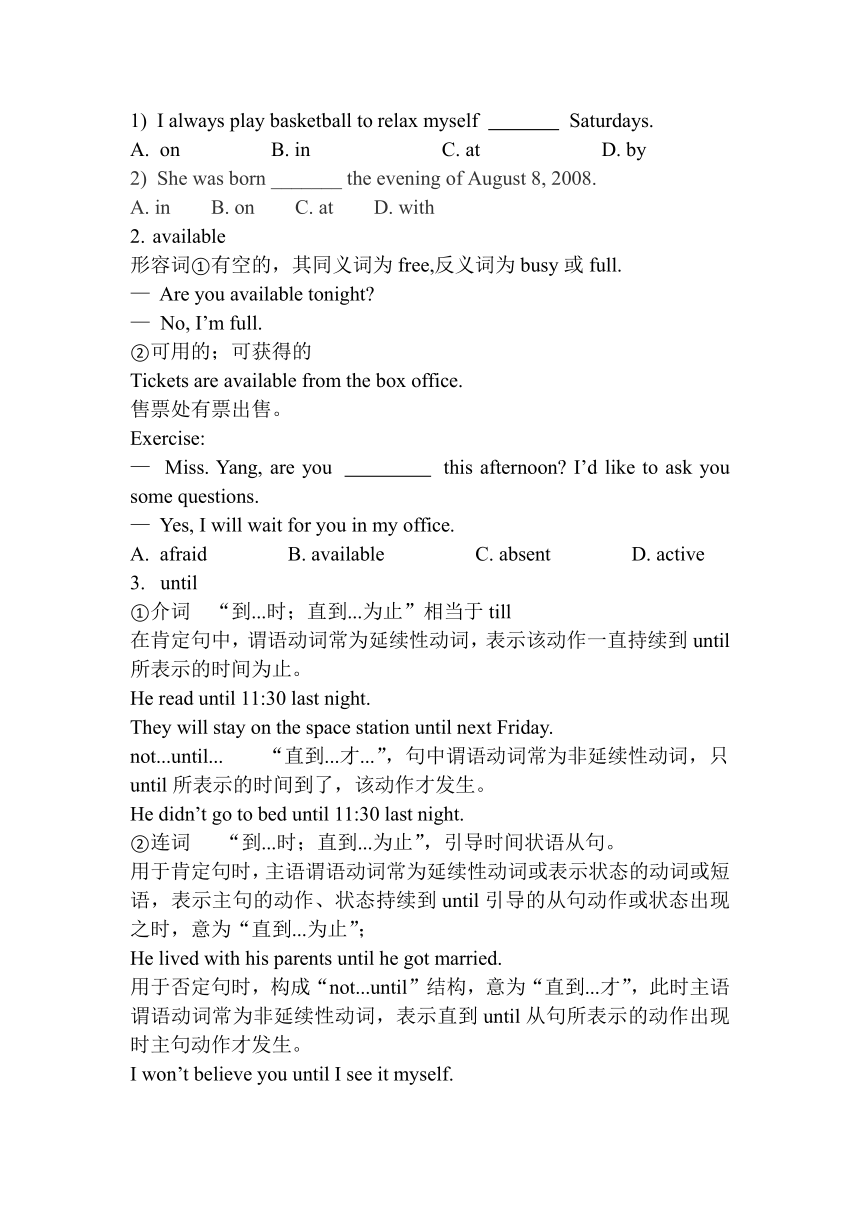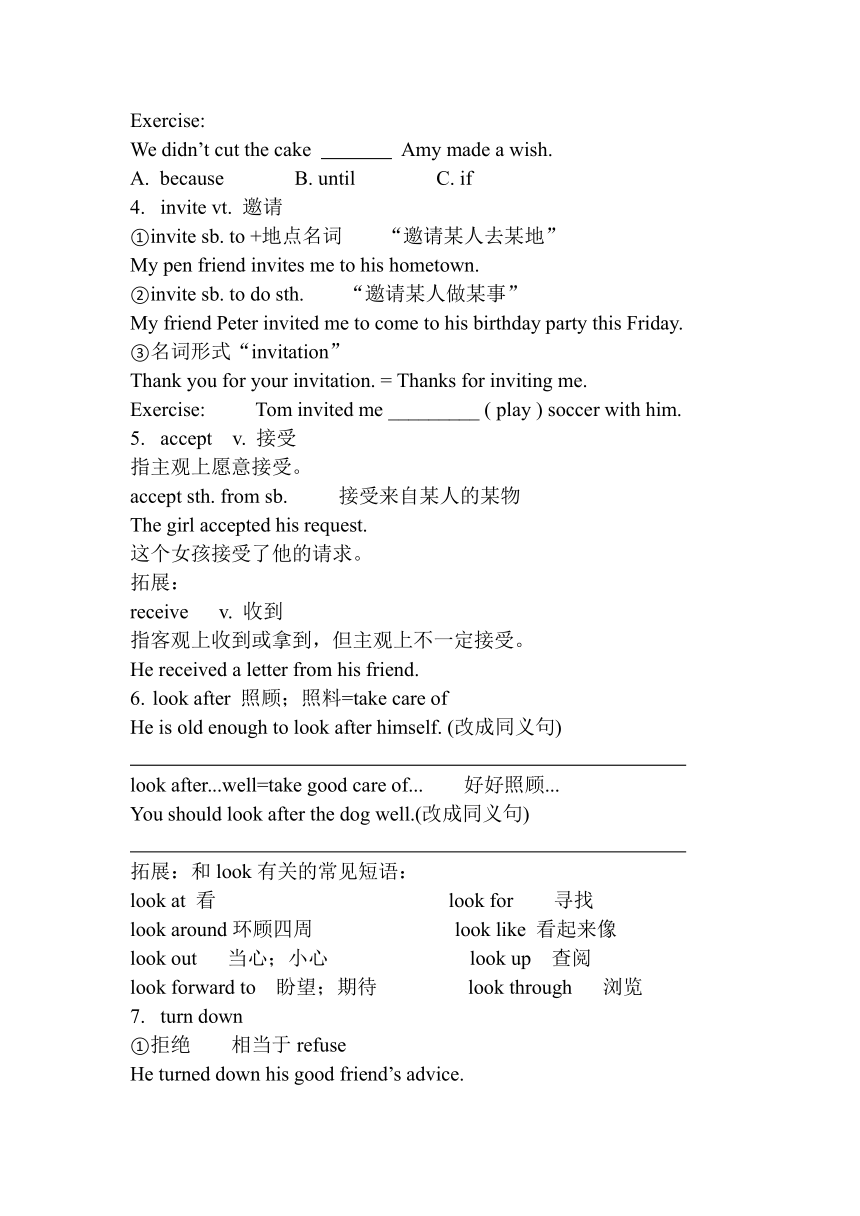人教八年级英语上册 Unit 9 Can you come to my party?知识点+练习
文档属性
| 名称 | 人教八年级英语上册 Unit 9 Can you come to my party?知识点+练习 |  | |
| 格式 | zip | ||
| 文件大小 | 98.0KB | ||
| 资源类型 | 教案 | ||
| 版本资源 | 人教新目标(Go for it)版 | ||
| 科目 | 英语 | ||
| 更新时间 | 2020-12-24 20:34:40 | ||
图片预览




文档简介
Unit9
Can
you
come
to
my
party?知识点
课本基础知识梳理:
the
day
before
yesterday
前天
the
day
after
tomorrow
后天
on
Saturday
afternoon
在周六下午
on
the
weekend
在周末
another
time
其他时间
prepare
for
an
exam
为考试做准备
7.study
for
a
test
备考
8.
have
the
flu
患感冒
9.
go
to
the/a
doctor
去看医生
10.be
available
to
do
sth
=
be
free
to
do
sth
有空做某事
11.go
to
the
movies
去看电影
12.go
to
the
concert
去听音乐会
13.go
hike
riding
骑自行车
14.go
back
to...
回到...
15.
hang
out
with
sb
和某人闲逛.
16.look
after
sb./sth.
照顾某人/物
=take
care
of
sb.
/sth.
17.accept/make/turn
down
an
invitation
接受/发出/拒绝邀请
18.turn
down
拒绝
19.take/have
a
trip
去旅行
20.help
out
帮助...分担工作、解决难题
21.hear
from
sb.
收到某人的来信、电话等=receive
a
letter
from
sb.
22.say...to
sb.
对某人说...
23.reply
(in
writing)to...
(书面)回复...
24.make
it
能够出席(或到场),约定在...
25.have
a
surprise
party
举办惊喜聚会
26.a
housewarming
party
乔迁聚会
27.by
now=so
far
到目前为止
28.
not...until...
直到...才...
29.so
that
以便;为了;所以
30.at
the
end
of...
在...末
31.the
opening
of...
...的开幕式
32.prepare
to
do
sth.
准备做某事
33.refuse
to
do
sth.
拒绝做某事
34.would
like
to
do
sth.
想/愿意做某事
35.be
sad/
glad
to
do
sth.
对做某事感到难过/高兴
36.the
best
way
to
do
sth.
做某事的最佳方式
37.the
best
time
to
do
sth.
做某事的最佳时间
38.thanks
for
doing
sth.
感谢做某事
39.look
forward
to
doing
sth.
期盼做某事
40.invite
sb.
to
do
sth.
邀请某人做某事
41.
one
of
+
adj
最高级+
可数名词复数
...中最...之一
42.Would
you
like
to
do
sth?你想要做某事吗?
Yes,
I’d
like
/
love
to.是的,我很愿意。
Sorry,
I
can’t.对不起,我不能。
43.Would
you
like
some
+
n?
Yes,
please.
/
No,
thanks.
你想要某物吗?
是的/
不,谢谢。
44.What
day
is
it
today?
It’s
+星期.
今天星期几?
45.What’s
the
date
today?
It’s
+
月日(序数词).
今天日期是多少?
46.What’s
today?
It’s
+
星期+日期.
今天几号星期几?
重要知识点讲解:
on
Saturday
afternoon
在具体的某一天或某一天的上午、下午或晚上前,用介词on.
on
the
morning
of
May
1st
on
Monday
evening
拓展:
①at用于时刻前,以及一些固定短语中。
at
10:10
at
noon
at
night
②in用于世纪、年、季节、月份前,也可以泛指在上午、下午或晚上。
in
2020
in
winter
in
December
in
the
morning
助记口诀:
时间介词on,
at与in的用法
on后具体某一天,日期、星期、节日前。
at用在时刻前,也与正午、午夜连。
月份、季节与年份,
in须用在其前面。
Exercise:
I
always
play
basketball
to
relax
myself
Saturdays.
on
B.
in
C.
at
D.
by
She
was
born
_______
the
evening
of
August
8,
2008.
A.
in
B.
on
C.
at
D.
with
available
形容词①有空的,其同义词为free,反义词为busy或full.
—
Are
you
available
tonight?
—
No,
I’m
full.
②可用的;可获得的
Tickets
are
available
from
the
box
office.
售票处有票出售。
Exercise:
—
Miss.
Yang,
are
you
this
afternoon?
I’d
like
to
ask
you
some
questions.
—
Yes,
I
will
wait
for
you
in
my
office.
afraid
B.
available
C.
absent
D.
active
until
①介词
“到...时;直到...为止”相当于till
在肯定句中,谓语动词常为延续性动词,表示该动作一直持续到until所表示的时间为止。
He
read
until
11:30
last
night.
They
will
stay
on
the
space
station
until
next
Friday.
not...until...
“直到...才...”,句中谓语动词常为非延续性动词,只until所表示的时间到了,该动作才发生。
He
didn’t
go
to
bed
until
11:30
last
night.
②连词
“到...时;直到...为止”,引导时间状语从句。
用于肯定句时,主语谓语动词常为延续性动词或表示状态的动词或短语,表示主句的动作、状态持续到until引导的从句动作或状态出现之时,意为“直到...为止”;
He
lived
with
his
parents
until
he
got
married.
用于否定句时,构成“not...until”结构,意为“直到...才”,此时主语谓语动词常为非延续性动词,表示直到until从句所表示的动作出现时主句动作才发生。
I
won’t
believe
you
until
I
see
it
myself.
Exercise:
We
didn’t
cut
the
cake
Amy
made
a
wish.
because
B.
until
C.
if
invite
vt.
邀请
①invite
sb.
to
+地点名词
“邀请某人去某地”
My
pen
friend
invites
me
to
his
hometown.
②invite
sb.
to
do
sth.
“邀请某人做某事”
My
friend
Peter
invited
me
to
come
to
his
birthday
party
this
Friday.
③名词形式“invitation”
Thank
you
for
your
invitation.
=
Thanks
for
inviting
me.
Exercise:
Tom
invited
me
_________
(
play
)
soccer
with
him.
accept
v.
接受
指主观上愿意接受。
accept
sth.
from
sb.
接受来自某人的某物
The
girl
accepted
his
request.
这个女孩接受了他的请求。
拓展:
receive
v.
收到
指客观上收到或拿到,但主观上不一定接受。
He
received
a
letter
from
his
friend.
look
after
照顾;照料=take
care
of
He
is
old
enough
to
look
after
himself.
(改成同义句)
look
after...well=take
good
care
of...
好好照顾...
You
should
look
after
the
dog
well.(改成同义句)
拓展:和look有关的常见短语:
look
at
看
look
for
寻找
look
around环顾四周
look
like
看起来像
look
out
当心;小心
look
up
查阅
look
forward
to
盼望;期待
look
through
浏览
turn
down
①拒绝
相当于refuse
He
turned
down
his
good
friend’s
advice.
注意:turn
down是一个“动词+副词”型短语,人称代词作宾语时,人称代词要放在turn
与down之间;
②关小;调低
The
baby
is
sleeping,
so
please
turn
down
the
radio.
Exercise:
你应该学会礼貌地拒绝别人的邀请。
(turn)
You
are
supposed
to
learn
others’
invitation
politely.
辨析:
see
sb.do
sth
看见某人做某事
强调看到了动作的全过程或动作经常发生
see
sb.
doing
sth
看见某人正在做某事
强调看到的动作正在发生
I
often
see
him
draw
a
picture.
I
saw
her
cleaning
the
classroom.
so
that
以便;为了
引导目的状语从句
I
study
hard
every
day
so
that
I
can
catch
up
with
Tom.
我每天努力学习,以便能赶上Tom.
so
that引导目的状语从句时与in
order
to
同义,只是前者后面跟句子,后者后面跟动词原形。
把上面一句话改成同义句。
Exercise:
We
should
take
care
of
the
earth
we
can
make
a
better
world
to
live
in.
so
that
B.until
C.
in
order
to
D.
even
if
look
forward
to
期待;盼望
其中to为介词,其后可跟名词、代词或动词-ing形式作宾语。
Cindy
is
looking
forward
to
her
birthday
party.
I’m
looking
forward
to
hearing
from
you.
hear
from
sb.
收到某人的来信、电话等
相当于receive
a
letter
/
telephone
call
from
sb.
I
heard
from
my
mother
last
week.
=
I
received/
got
a
letter
from
my
mother
last
week.
拓展:
hear
of=hear
about
听说
I
heard
of
the
story.
辨析:
too
much
+不可数名词
“太多”
much
too
+
形容词/
副词原级
“太....”
too
many
+
可数名词复数
“太多”
Exercise:
1)
There
is
_______
snow
on
the
road.
At
the
same
time,
________
cars
are
running
on
the
street.
We
should
pay
attention
to
safety.
2)
The
problem
is
________
difficult.
3)
He
ate
food
this
morning,
and
it’s
hard
for
him
to
walk
fast.
13.感叹句
What
+
名词短语+主语+谓语!此情况下主、谓常可省略。
What
lazy
boys
(they
are)!
What
hard
work
(it
is)!
What
good
news
(it
is)!
What
a
good
idea!
What
bad
weather
(it
is)!
What
clever
girls
(you
are)!
常见的不可数名词:
news,
work,
weather,
information,
advice,
music等
How
+形容词
/
副词
+
主语
+
谓语!
How
hard
the
work
is!
How
fast
he
runs!
How
rude
you
are!
How
carefully
they
are
listening!
How
bad
the
weather
is!
Exercise:
(
)1._______a
clever
boy
he
is
!??
?A.
What??????
?
B.
How?????
?C.
What’s
(
)2._______she
dances!?????????
?A.
How
good?????
B.
How
well?????
??
C.
What
well
(
)3._______quiet
the
park
is!?????
?A.
What
a??????
B.
How???
?
C.
How
a
(
)4._____his
father
works!????????
A.
How
careful??????
B.
How
carefully?????
??
C.
What
careful
(
)5.
._______hard-working
Chinese
people!????
A.
How??????
B.
What???
?
C.
How
do
(
)6.______delicious
soup!???????
?A.
How?????
B.
What?????
?
C.
What
a
三:重要语法讲解:
情态动词can表示邀请
情态动词can除了表示能力、许可或猜测,还可以表示邀请;could比can更礼貌、委婉。
一:can表示有礼貌的向别人发出邀请,请求,建议,征求别人的意见的几种表达方式及答语:
Can/Could/Will/Would
+主语+动词原形+其他?
1)主语是:
you
例如:Can/Could
you
go
shopping
with
me?
接受邀请回答:
Sure,I’d
love
to
Sure,
That
sounds
great.
Yes,
I’d
love
to.
Yes,主语+can.
拒绝邀请回答:
Sorry.
I’m
not
available/free.
I’m
sorry.
I’m
not
free
this
weekend.
Sorry,
I
have
to
look
after
my
sister.
Sorry,I
must
study
for
a
math
test.
I’m
afraid
not.
I
have
the
flu.
I’d
love
to,
but
I’m
afraid
I
can’t
.I
might
(have
to)
study
English
for
test.
2)第三人称
Can/Could
he/she
/they
go
shopping
with
me?
Sure,I
think
he/she/they
can/will.
Can/Could
he/she
/they
go
shopping
with
me?
No,
he/she
can’t.
He
has
to
help
his
parents.
No,
she’s
not
available.
She
must
go
to
the
doctor.
Can/Could
they
go
shopping
with
me?
No,
they’re
not
free.
They
might
(have
to)
meet
their
friends.
二、其他表示邀请、请求、建议或征求别人的意见的句型:
1
直接建议:
Let’s+
do
sth.
让我们做某事吧!
Let’s
going
shopping.
2.委婉的建议
1)
Shall
we+
do
sth.
我们做某事好吗?
Shall
we
go
out
for
a
walk?
2)
Would
you
mind
(not
)
+
doing
sth.?不要做/做某事介意吗?好吗?
Would
you
mind
opening
the
window?
3.征求建议:
How/What
about+名词/
doing
sth.?
做某事怎么样?
How
about
playing
basketball?
4
劝告性建议:
You’d
better(not)do
sth.你最好不要做/做某事。
You’d
better
not
see
such
books.
5
责备性建议:
Why
don’t
you
do
sth.?
你为什么不做某事?
Why
don’t
you
ask
your
teacher?
=Why
not
do
sth.?
Why
not
ask
your
teacher?
6.请求性建议:
1)Would
you
like
(not)
to
do
sth?
你不要做/做某事好吗?
Would
you
like
to
have
a
rest
?
2)Would/Could
you
you
please
(not)
do
sth.?
请你不要做/做某事好吗?
Would
you
please
wait
for
me
?
Exercise:
—
you
come
with
me
to
go
shopping
now?
—I’d
love
to,but
I
have
to
study
for
my
English
test.
Should
B.May
C.Must
D.Can
—Could
you
please
have
a
walk
with
me?
—Sorry,
I
.I
have
something
important
to
do
now.
mustn’t
B.needn’t
C.can’t
D.may
not
—
Can
you
to
my
house
to
watch
CDs?
—Yes,
I’d
love
to.
come
B.
comes
C.
coming
D.to
come
—
Can
you
go
to
the
movies
with
us
tomorrow
night?
—
.
Sure,
I’m
busy
B.
Sure,
I’d
love
to
C.
Sorry,
I’d
love
to
D.I’m
sorry
I
can
—
Can
you
go
to
the
supermarket
this
weekend?
—
.
I
have
to
help
my
parents
with
housework.
Sure,
I’d
love
to
B.
I’m
afraid
so
C.
I’m
afraid
not
D.Sure,
I
love
Can
you
come
to
my
party?知识点
课本基础知识梳理:
the
day
before
yesterday
前天
the
day
after
tomorrow
后天
on
Saturday
afternoon
在周六下午
on
the
weekend
在周末
another
time
其他时间
prepare
for
an
exam
为考试做准备
7.study
for
a
test
备考
8.
have
the
flu
患感冒
9.
go
to
the/a
doctor
去看医生
10.be
available
to
do
sth
=
be
free
to
do
sth
有空做某事
11.go
to
the
movies
去看电影
12.go
to
the
concert
去听音乐会
13.go
hike
riding
骑自行车
14.go
back
to...
回到...
15.
hang
out
with
sb
和某人闲逛.
16.look
after
sb./sth.
照顾某人/物
=take
care
of
sb.
/sth.
17.accept/make/turn
down
an
invitation
接受/发出/拒绝邀请
18.turn
down
拒绝
19.take/have
a
trip
去旅行
20.help
out
帮助...分担工作、解决难题
21.hear
from
sb.
收到某人的来信、电话等=receive
a
letter
from
sb.
22.say...to
sb.
对某人说...
23.reply
(in
writing)to...
(书面)回复...
24.make
it
能够出席(或到场),约定在...
25.have
a
surprise
party
举办惊喜聚会
26.a
housewarming
party
乔迁聚会
27.by
now=so
far
到目前为止
28.
not...until...
直到...才...
29.so
that
以便;为了;所以
30.at
the
end
of...
在...末
31.the
opening
of...
...的开幕式
32.prepare
to
do
sth.
准备做某事
33.refuse
to
do
sth.
拒绝做某事
34.would
like
to
do
sth.
想/愿意做某事
35.be
sad/
glad
to
do
sth.
对做某事感到难过/高兴
36.the
best
way
to
do
sth.
做某事的最佳方式
37.the
best
time
to
do
sth.
做某事的最佳时间
38.thanks
for
doing
sth.
感谢做某事
39.look
forward
to
doing
sth.
期盼做某事
40.invite
sb.
to
do
sth.
邀请某人做某事
41.
one
of
+
adj
最高级+
可数名词复数
...中最...之一
42.Would
you
like
to
do
sth?你想要做某事吗?
Yes,
I’d
like
/
love
to.是的,我很愿意。
Sorry,
I
can’t.对不起,我不能。
43.Would
you
like
some
+
n?
Yes,
please.
/
No,
thanks.
你想要某物吗?
是的/
不,谢谢。
44.What
day
is
it
today?
It’s
+星期.
今天星期几?
45.What’s
the
date
today?
It’s
+
月日(序数词).
今天日期是多少?
46.What’s
today?
It’s
+
星期+日期.
今天几号星期几?
重要知识点讲解:
on
Saturday
afternoon
在具体的某一天或某一天的上午、下午或晚上前,用介词on.
on
the
morning
of
May
1st
on
Monday
evening
拓展:
①at用于时刻前,以及一些固定短语中。
at
10:10
at
noon
at
night
②in用于世纪、年、季节、月份前,也可以泛指在上午、下午或晚上。
in
2020
in
winter
in
December
in
the
morning
助记口诀:
时间介词on,
at与in的用法
on后具体某一天,日期、星期、节日前。
at用在时刻前,也与正午、午夜连。
月份、季节与年份,
in须用在其前面。
Exercise:
I
always
play
basketball
to
relax
myself
Saturdays.
on
B.
in
C.
at
D.
by
She
was
born
_______
the
evening
of
August
8,
2008.
A.
in
B.
on
C.
at
D.
with
available
形容词①有空的,其同义词为free,反义词为busy或full.
—
Are
you
available
tonight?
—
No,
I’m
full.
②可用的;可获得的
Tickets
are
available
from
the
box
office.
售票处有票出售。
Exercise:
—
Miss.
Yang,
are
you
this
afternoon?
I’d
like
to
ask
you
some
questions.
—
Yes,
I
will
wait
for
you
in
my
office.
afraid
B.
available
C.
absent
D.
active
until
①介词
“到...时;直到...为止”相当于till
在肯定句中,谓语动词常为延续性动词,表示该动作一直持续到until所表示的时间为止。
He
read
until
11:30
last
night.
They
will
stay
on
the
space
station
until
next
Friday.
not...until...
“直到...才...”,句中谓语动词常为非延续性动词,只until所表示的时间到了,该动作才发生。
He
didn’t
go
to
bed
until
11:30
last
night.
②连词
“到...时;直到...为止”,引导时间状语从句。
用于肯定句时,主语谓语动词常为延续性动词或表示状态的动词或短语,表示主句的动作、状态持续到until引导的从句动作或状态出现之时,意为“直到...为止”;
He
lived
with
his
parents
until
he
got
married.
用于否定句时,构成“not...until”结构,意为“直到...才”,此时主语谓语动词常为非延续性动词,表示直到until从句所表示的动作出现时主句动作才发生。
I
won’t
believe
you
until
I
see
it
myself.
Exercise:
We
didn’t
cut
the
cake
Amy
made
a
wish.
because
B.
until
C.
if
invite
vt.
邀请
①invite
sb.
to
+地点名词
“邀请某人去某地”
My
pen
friend
invites
me
to
his
hometown.
②invite
sb.
to
do
sth.
“邀请某人做某事”
My
friend
Peter
invited
me
to
come
to
his
birthday
party
this
Friday.
③名词形式“invitation”
Thank
you
for
your
invitation.
=
Thanks
for
inviting
me.
Exercise:
Tom
invited
me
_________
(
play
)
soccer
with
him.
accept
v.
接受
指主观上愿意接受。
accept
sth.
from
sb.
接受来自某人的某物
The
girl
accepted
his
request.
这个女孩接受了他的请求。
拓展:
receive
v.
收到
指客观上收到或拿到,但主观上不一定接受。
He
received
a
letter
from
his
friend.
look
after
照顾;照料=take
care
of
He
is
old
enough
to
look
after
himself.
(改成同义句)
look
after...well=take
good
care
of...
好好照顾...
You
should
look
after
the
dog
well.(改成同义句)
拓展:和look有关的常见短语:
look
at
看
look
for
寻找
look
around环顾四周
look
like
看起来像
look
out
当心;小心
look
up
查阅
look
forward
to
盼望;期待
look
through
浏览
turn
down
①拒绝
相当于refuse
He
turned
down
his
good
friend’s
advice.
注意:turn
down是一个“动词+副词”型短语,人称代词作宾语时,人称代词要放在turn
与down之间;
②关小;调低
The
baby
is
sleeping,
so
please
turn
down
the
radio.
Exercise:
你应该学会礼貌地拒绝别人的邀请。
(turn)
You
are
supposed
to
learn
others’
invitation
politely.
辨析:
see
sb.do
sth
看见某人做某事
强调看到了动作的全过程或动作经常发生
see
sb.
doing
sth
看见某人正在做某事
强调看到的动作正在发生
I
often
see
him
draw
a
picture.
I
saw
her
cleaning
the
classroom.
so
that
以便;为了
引导目的状语从句
I
study
hard
every
day
so
that
I
can
catch
up
with
Tom.
我每天努力学习,以便能赶上Tom.
so
that引导目的状语从句时与in
order
to
同义,只是前者后面跟句子,后者后面跟动词原形。
把上面一句话改成同义句。
Exercise:
We
should
take
care
of
the
earth
we
can
make
a
better
world
to
live
in.
so
that
B.until
C.
in
order
to
D.
even
if
look
forward
to
期待;盼望
其中to为介词,其后可跟名词、代词或动词-ing形式作宾语。
Cindy
is
looking
forward
to
her
birthday
party.
I’m
looking
forward
to
hearing
from
you.
hear
from
sb.
收到某人的来信、电话等
相当于receive
a
letter
/
telephone
call
from
sb.
I
heard
from
my
mother
last
week.
=
I
received/
got
a
letter
from
my
mother
last
week.
拓展:
hear
of=hear
about
听说
I
heard
of
the
story.
辨析:
too
much
+不可数名词
“太多”
much
too
+
形容词/
副词原级
“太....”
too
many
+
可数名词复数
“太多”
Exercise:
1)
There
is
_______
snow
on
the
road.
At
the
same
time,
________
cars
are
running
on
the
street.
We
should
pay
attention
to
safety.
2)
The
problem
is
________
difficult.
3)
He
ate
food
this
morning,
and
it’s
hard
for
him
to
walk
fast.
13.感叹句
What
+
名词短语+主语+谓语!此情况下主、谓常可省略。
What
lazy
boys
(they
are)!
What
hard
work
(it
is)!
What
good
news
(it
is)!
What
a
good
idea!
What
bad
weather
(it
is)!
What
clever
girls
(you
are)!
常见的不可数名词:
news,
work,
weather,
information,
advice,
music等
How
+形容词
/
副词
+
主语
+
谓语!
How
hard
the
work
is!
How
fast
he
runs!
How
rude
you
are!
How
carefully
they
are
listening!
How
bad
the
weather
is!
Exercise:
(
)1._______a
clever
boy
he
is
!??
?A.
What??????
?
B.
How?????
?C.
What’s
(
)2._______she
dances!?????????
?A.
How
good?????
B.
How
well?????
??
C.
What
well
(
)3._______quiet
the
park
is!?????
?A.
What
a??????
B.
How???
?
C.
How
a
(
)4._____his
father
works!????????
A.
How
careful??????
B.
How
carefully?????
??
C.
What
careful
(
)5.
._______hard-working
Chinese
people!????
A.
How??????
B.
What???
?
C.
How
do
(
)6.______delicious
soup!???????
?A.
How?????
B.
What?????
?
C.
What
a
三:重要语法讲解:
情态动词can表示邀请
情态动词can除了表示能力、许可或猜测,还可以表示邀请;could比can更礼貌、委婉。
一:can表示有礼貌的向别人发出邀请,请求,建议,征求别人的意见的几种表达方式及答语:
Can/Could/Will/Would
+主语+动词原形+其他?
1)主语是:
you
例如:Can/Could
you
go
shopping
with
me?
接受邀请回答:
Sure,I’d
love
to
Sure,
That
sounds
great.
Yes,
I’d
love
to.
Yes,主语+can.
拒绝邀请回答:
Sorry.
I’m
not
available/free.
I’m
sorry.
I’m
not
free
this
weekend.
Sorry,
I
have
to
look
after
my
sister.
Sorry,I
must
study
for
a
math
test.
I’m
afraid
not.
I
have
the
flu.
I’d
love
to,
but
I’m
afraid
I
can’t
.I
might
(have
to)
study
English
for
test.
2)第三人称
Can/Could
he/she
/they
go
shopping
with
me?
Sure,I
think
he/she/they
can/will.
Can/Could
he/she
/they
go
shopping
with
me?
No,
he/she
can’t.
He
has
to
help
his
parents.
No,
she’s
not
available.
She
must
go
to
the
doctor.
Can/Could
they
go
shopping
with
me?
No,
they’re
not
free.
They
might
(have
to)
meet
their
friends.
二、其他表示邀请、请求、建议或征求别人的意见的句型:
1
直接建议:
Let’s+
do
sth.
让我们做某事吧!
Let’s
going
shopping.
2.委婉的建议
1)
Shall
we+
do
sth.
我们做某事好吗?
Shall
we
go
out
for
a
walk?
2)
Would
you
mind
(not
)
+
doing
sth.?不要做/做某事介意吗?好吗?
Would
you
mind
opening
the
window?
3.征求建议:
How/What
about+名词/
doing
sth.?
做某事怎么样?
How
about
playing
basketball?
4
劝告性建议:
You’d
better(not)do
sth.你最好不要做/做某事。
You’d
better
not
see
such
books.
5
责备性建议:
Why
don’t
you
do
sth.?
你为什么不做某事?
Why
don’t
you
ask
your
teacher?
=Why
not
do
sth.?
Why
not
ask
your
teacher?
6.请求性建议:
1)Would
you
like
(not)
to
do
sth?
你不要做/做某事好吗?
Would
you
like
to
have
a
rest
?
2)Would/Could
you
you
please
(not)
do
sth.?
请你不要做/做某事好吗?
Would
you
please
wait
for
me
?
Exercise:
—
you
come
with
me
to
go
shopping
now?
—I’d
love
to,but
I
have
to
study
for
my
English
test.
Should
B.May
C.Must
D.Can
—Could
you
please
have
a
walk
with
me?
—Sorry,
I
.I
have
something
important
to
do
now.
mustn’t
B.needn’t
C.can’t
D.may
not
—
Can
you
to
my
house
to
watch
CDs?
—Yes,
I’d
love
to.
come
B.
comes
C.
coming
D.to
come
—
Can
you
go
to
the
movies
with
us
tomorrow
night?
—
.
Sure,
I’m
busy
B.
Sure,
I’d
love
to
C.
Sorry,
I’d
love
to
D.I’m
sorry
I
can
—
Can
you
go
to
the
supermarket
this
weekend?
—
.
I
have
to
help
my
parents
with
housework.
Sure,
I’d
love
to
B.
I’m
afraid
so
C.
I’m
afraid
not
D.Sure,
I
love
同课章节目录
- Unit 1 Where did you go on vacation?
- Section A
- Section B
- Unit 2 How often do you exercise?
- Section A
- Section B
- Unit 3 I'm more outgoing than my sister.
- Section A
- Section B
- Unit 4 What's the best movie theater?
- Section A
- Section B
- Unit 5 Do you want to watch a game show?
- Section A
- Section B
- Unit 6 I'm going to study computer science.
- Section A
- Section B
- Unit 7 Will people have robots?
- Section A
- Section B
- Unit 8 How do you make a banana milk shake?
- Section A
- Section B
- Unit 9 Can you come to my party?
- Section A
- Section B
- Unit 10 If you go to the party, you'll have a grea
- Section A
- Section B
